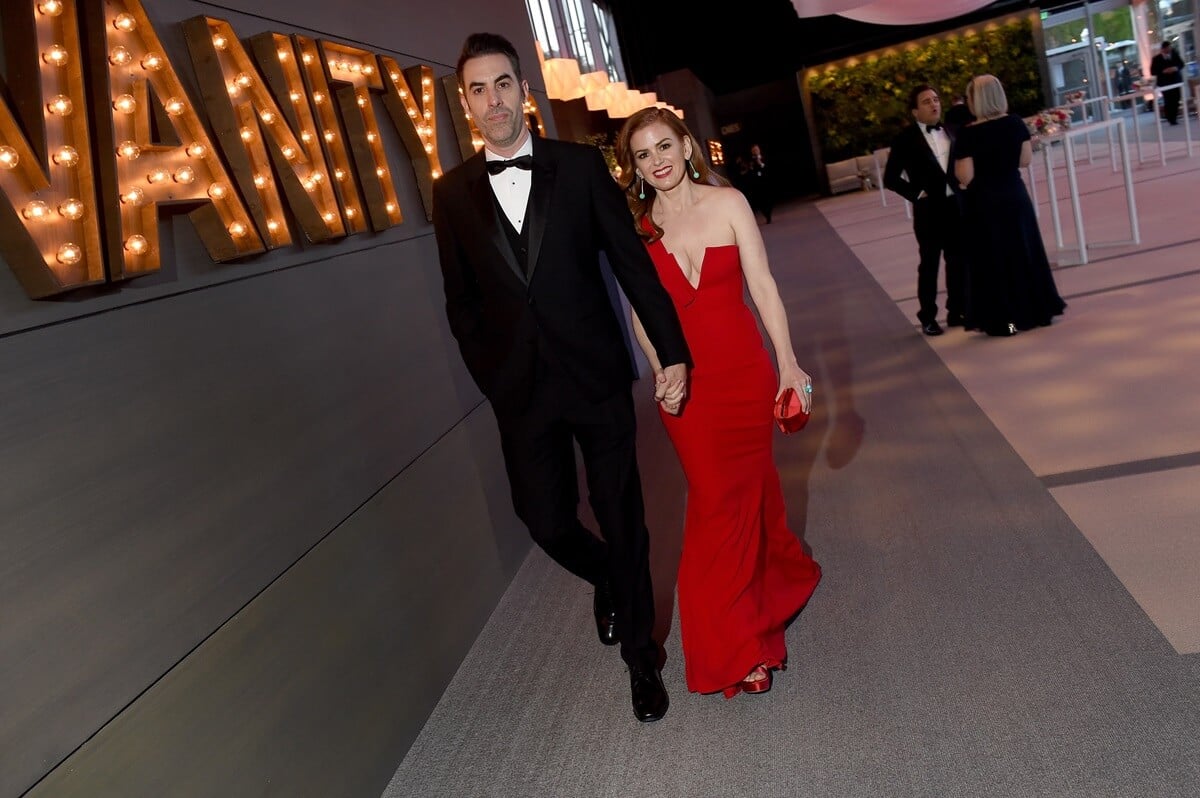
Isla Fisher Joked She Was Afraid Sacha Baron Cohen Would Be Arrested for His Films
Actor Isla Fisher once confided that being married to Sacha Baron Cohen wasn’t exactly stress-free. Because of Cohen’s antics, Fisher was always concerned that she and her ex-husband would get into legitimate legal trouble.
Isla Fisher was worried there would be severe real-life consequences for Sacha Baron Cohen’s fictional characters

Fisher and Cohen may have married in 2010, but they’ve known each other since the year 2000, and started dating in 2001. This means that Fisher was with Cohen during many of the raunchiest moments of the actor’s career. Cohen was known for his creative and provocative alter-egos. And although these characters were fictional, they famously interacted in real-world settings.
Cohen’s performances made for some interesting interactions between himself and Fisher. In an interview with Square Mile, Fisher once confided she had her parents meet her ex-husband while he was in the middle of working.
“My dad and stepmum flew out to Cape Town, as they really wanted to see Sacha working, but I neglected to check the call sheet,” Fisher said . “I took them over to set and all I could see were two animatronic elephants surrounded by the film crew. We got closer, and we couldn’t see Sacha anywhere. Then suddenly my husband popped his head out of the elephant’s vagina and proceeded to fight against the other elephant’s erect penis. I saw my stepmum’s face – and my mouth was just opening and closing like a goldfish, but no words came out.”
Cohen’s journalist alter-ego Borat was also known for pushing boundaries. So much so that the titular feature Borat was banned in several countries for its content. Fisher knew what she was getting into being in a relationship with Cohen. This was why she had to constantly ask her husband if they were in any trouble.
“Instead of asking: ‘Are you going to pick up the dry cleaning?’ I’d ask, ‘Are we getting sued by somebody?’ or ‘Is there a warrant out for your arrest?’ But luckily when he started to make fictional films like The Dictator, we didn’t have to have those kinds of conversations, because there were no legal implications,” Fisher said.
Why Sacha Baron Cohen thought it was time to retire his alter-egos for good
Cohen’s characters benefited because many people he interacted with had no idea they were fictional. This allowed audiences to see genuine reactions and responses to some of the comedian’s unpredictable behavior.
But the first Borat film might’ve changed things. Borat saw Cohen’s journalist character interacting with Americans across the country. The 2006 mockumentary was both a critical and financial success, earning over $200 million at the box-office on a budget of $18 million.
But the film’s popularity might’ve rendered Cohen’s Borat character obsolete. Many fans were now in on the joke, and any future interactions with the foreign journalist might’ve lost its authenticity.
Still, Cohen didn’t retire Borat quickly. The character would make small appearances here and there over the years. In 2020, he revisited the character for the sequel film Borat Subsequent Moviefilm. He confided that he was worried about the state the country was going in during the Trump administration. The Borat sequel was his response to what he felt was the country’s declining democracy.
“I felt very clearly from the start of the [Trump] administration that we were heading towards authoritarianism. And so I felt I had to do something,” Cohen said. “I was terrified that if Trump got in again, that America would be a democracy in name only.”
But the situations Cohen found himself in as Borat was too intimidating even for him. Cohen was already used to putting himself in real danger while playing his characters. But after going to a gun rally in-character, he realized it might’ve been time to stop gambling with his life.
“I was wearing a bulletproof vest, and that’s only the second time in my career that I’ve ever done that. But I was told that there was a chance that somebody might try to shoot at me. I was very aware that once the crowd realized that I was a fake, that it could turn really ugly and it could be really dangerous,” Cohen said according to NPR.
Afterwards, Cohen didn’t see himself ever repeating the same mistake again.
“At some point, your luck runs out. And so I never wanted to do this stuff again,” Cohen said. “I can’t.”


